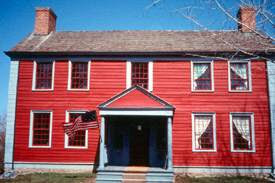 Spiritualism was born in the spring of 1848 when Margaret and Kate Fox heard strange rappings in their Hydesville NY bedroom. Within two years the two “Rochester Rappers” with their sister Leah were touring the country communicating with spirits. The Free Church of Peterboro was one site for the rapping demonstrations. “Scraps of paper in the Gerrit Smith Papers showing questions posed to a spirit medium … revealed that the family attempted to communicate with their loved ones, including Fitzhugh and Peter, after they had died,” according to one historian.
Spiritualism was born in the spring of 1848 when Margaret and Kate Fox heard strange rappings in their Hydesville NY bedroom. Within two years the two “Rochester Rappers” with their sister Leah were touring the country communicating with spirits. The Free Church of Peterboro was one site for the rapping demonstrations. “Scraps of paper in the Gerrit Smith Papers showing questions posed to a spirit medium … revealed that the family attempted to communicate with their loved ones, including Fitzhugh and Peter, after they had died,” according to one historian.
At 2 pm on Sunday, July 24 the Gerrit Smith Estate National Historic Landmark in Peterboro will host programs on 19th Century spiritualism with particular attention to the Fox Sisters and Peterboro’s connections to the spiritualism movement. The program is open to the public and free.
The featured speaker Nancy Rubin Stuart (Osterville, Mass) will present Maggie Fox, Victorian America’s Reluctant Spiritualist. Upstate New York teenager Maggie Fox (1833-1893) rose to national fame as Victorian America’s “reluctant spiritualist.” Young and beautiful, Maggie’s alleged ability to communicate with spirits in America’s first seances of 1848 astounded the press, and made Maggie and her sisters the darlings of Broadway. Maggie inspired hundreds of imitators, and fascinated the most prominent men and women of her era, among them Horace Greeley, James Fenimore Cooper, Harriet Beecher Stowe, Mary Todd Lincoln, William Lloyd Garrison, Nathaniel Hawthorne, and William James. After a passionate love affair and secret marriage to distinguished Arctic explorer Dr. Elisha Kent Kane in 1856, during which Maggie promised to give up mediumship, her life took surprising twists and turns, culminating with a startling confession in 1888 at the New York Academy of Music. The lecture is accompanied by slides of Maggie Fox and her era.
Rubin explains that her purpose is neither to prove nor disprove the veracity of spirit communication, but rather to illustrate how 150 years ago the Fox sisters’ introduction of that idea swept through America and why it continues to fascinate people today. Maggie’s story is important, Rubin believes, because of passion – the passionate longing that 19th C. Americans had to once again talk with their beloved dead, and the passionate romance between Fox and Kane.
This Speakers in the Humanities event, which is free and open to the public, is made possible through the support of the New York Council for the Humanities, a state affiliate of the National Endowment for the Humanities. The Speakers in the Humanities program has linked distinguished scholars with diverse audiences since its launch in 1983, bringing the best in humanities scholarship to thousands of people at hundreds of cultural organizations in virtually every corner of New York State. This program is just one of the ways the New York Council for the Humanities helps all New Yorkers to lead vibrant intellectual lives by strengthening traditions of cultural literacy, critical inquiry, and civic participation.
After Stuart’s presentation, popular local performers and sisters Darothy DeAngelo and Sue Greenhagen will provide a light-hearted look at early spiritualism with a vignette of the Fox Sisters during a rapping session enticing the spirits of some “dearly departed.” DeAngelo portrays Maggie, and Sue portrays Kate.
Beginning at 1 pm, Michael Keene will sell and sign his recently published book by The History Press: Folklore and Legends of Rochester: The Mystery of Hoodoo Corner & Other Tales. The book includes the story of the Fox Sisters, as well as the anti-Masonic hysteria of the early nineteenth century and the unexplained disappearance of former Mason, Captain Morgan. Keene worked for twenty-five years in the financial services industry as a financial planner. He is also the producer of an award-winning 2008 film Visions, True Stories of Spiritualism, Secret Societies & Murder, which, in part, inspired his new book.
Copies of Town of Smithfield historian Donna Burdick’s paper “Spirited Women – and Men & Their Unpopular Causes” will be on sale at the Peterboro Mercantile for the benefit of the Peterboro Area Historical Society. Burdick’s document describes Spiritualism as it was introduced and “practiced” in Peterboro. Burdick refers to written accounts of medium sessions and spiritualism conferences.
The Gerrit Smith Estate and the National Abolition Hall of Fame and Museum in Peterboro are open from 1 – 5 p.m. on Saturdays and Sundays until October 23, 2011. Admission to each site is two dollars. Stewards and students are free. For more information:
Gerrit Smith Estate National Historic Landmark, 4543 Peterboro Road, Peterboro NY 13134-006- call 315-280-8828 or visit www.sca-peterboro.org






